Clash of Titans

Illinois Memorial Stadium
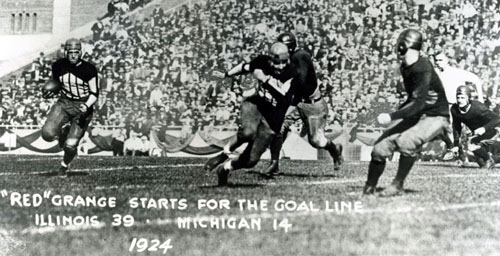
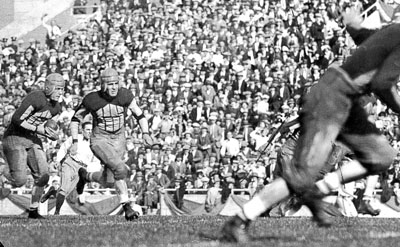
Red Grange runs wild against Michigan.
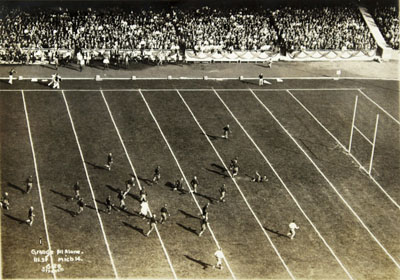
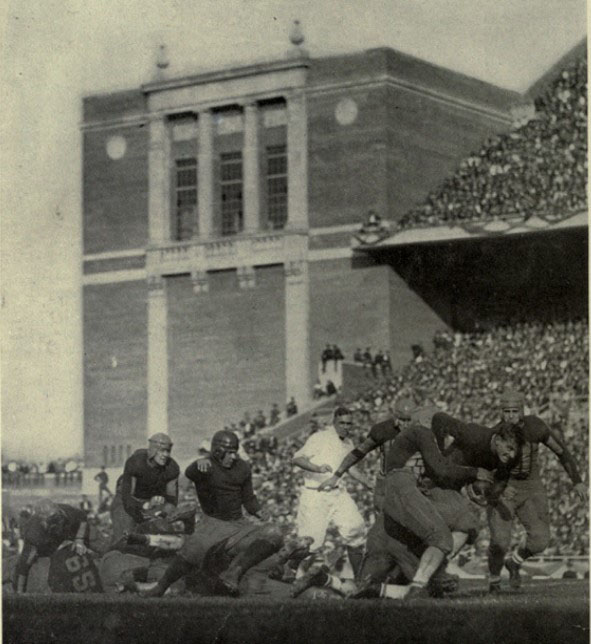
L: Grange scores one of his four first quarter touchdowns.
R: Michigan-Illinois action (University of Michiganesian Class of 1925)
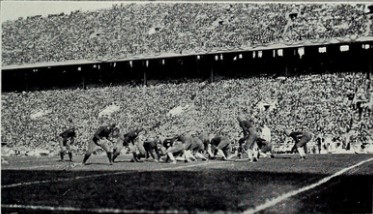
More Michigan-Illinois action (University of Illinois Illio Yearbook Class of 1926)
Games featuring a future Hall of Fame coach on each sideline.
October 18, 1924: Michigan @ Illinois
George Little vs Robert Zuppke
It was a festive occasion at the University of Illinois as $1,700,000 Memorial Stadium was officially dedicated. (The arena had actually been completed for some games in 1923.) To add to the excitement and allure of the game, Illinois designated the Michigan game as its homecoming. The capacity of 69,249 was exhausted (and an estimated 20,000 more were unable to get in) as the 2-0 Illini hosted the mighty Wolverines of Michigan, unscored on in their first two contests. The teams had not met in 1923 when both went 8-0 and claimed national titles. Illinois had been Big Ten champion by virtue of its 5-0 conference record vs. Michigan's 4-0.
The Illinois Central railroad added 16 extra trains from Chicago to accommodate those traveling to the game Saturday morning. Even more people went to the game by automobile, including a caravan that Michigan students organized from Ann Arbor. The city of Urbana shut off the traffic signals and used scores of police to control the flow of vehicles.
Temporary belachers at Memorial Stadium accommodated 11,000 fans. More than 600 others gathered at the university armory to view a special grid-graph presentation of the game.
An unknown number of fans listened to the radio broadcasts of the game on the University of Illinois' station WRM and Chicago Westinghouse station KYM. In addition, WGN in Chicago, headed by an Illinois alumnus, selected the Michigan game for its first football broadcast.

Illinois Memorial Stadium
Featured Player
Illinois' success in 1923 was partly attributable to the excellent coaching of Robert Zuppke and partly because of the play of 5'10" 170 lb. sophomore running back Harold "Red" Grange. At first, Red didn't even go out for football. He had played in high school but thought baseball and basketball were his better sports. (He also ran track.) When pressured by fraternity brothers, he joined the freshman team and was issued #77. In the first scrimmage against the varsity, he returned a punt 65 yards for a touchdown, and the legend of "The Galloping Ghost" began to form.
In his first varsity game against Nebraska, Grange scored touchdowns on runs of 50, 35, and 12y. His 125 yards in punt returns in that game is still the school record. Illinois' rock-ribbed defense held the first three opponents to one touchdown each and then pitched shutouts for the last five games to complete the undefeated campaign. Red was named All-American.
After one season, Grange ranked as a good but not great back. That perception changed in one quarter of football in the third game of his junior year against Michigan.
|
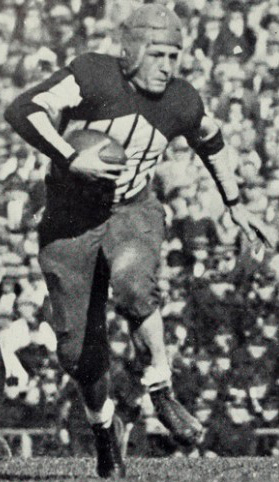 Illinois Illio Yearbook Class of 1926 |
Fielding Yost had been the Michigan football coach from 1901-1923. During that time, he compiled an incredible 151-27-10 record. He retired after the '23 season to focus on his duties as UM athletic director. His replacement was George Little, who had been Yost's top assistant for the 1922 and '23 seasons.
Zuppke became the Illinois head coach in 1913. His record stood at 53-21-6 going into the 1924 season. During that time, he developed a contentious rivalry with Yost. Their teams had met on the gridiron four times, each winning two. Zuppke was a firm believer in the psychological approach to winning football games. He had begun to prepare his players for the Michigan game the previous autumn after the Michigan student newspaper left Grange off its first team All-America list. The Michigan Daily explained the ommission of the consensus All-American halfback by saying that "all he could do was run."
Yost, who was nothing if not cocky, added more fuel to the fire by stating that Grange and the Illini would pose little problem for the Wolverines come autumn. Zuppke posted the insulting stories in the Illinois locker room during spring practice.
Zuppke wrote letters to his players during the summer of '24 in which he accused Yost of taking the Illini lightly. Grange recalled: "Zup had worked on that game from the start of the summer. He started telling us all kinds of things Yost had been saying about us all summer. It wasn't until a long time afterward that I found out that Yost had been in Europe the whole summer. He had gotten us so riled up about Yost that we just couldn't lose."
The Wolverines came to Champaign as heavy favorites. Even though he was not the head coach, Yost predicted trouble for Red. "Master Grange will be carefully watched. Every time he takes the ball, there will be 11 hard, clean Michigan tacklers headed for him at the same time. I know he is a great runner, but great runners have the hardest time gaining ground when met by special preparation." Notice that Yost used the term "Master Grange" rather than "Mister Grange" or just "Grange."
The "special preparation" would not be nearly enough.
Uniform Change Surprises Wolverines
Grange: "On the eve of battle Zup did his customary job of bolstering our confidence and keeping us in high spirits. We never really knew how worried he was about the condition of two of his key blockers. Captain Frank Rokusek, the left end, still had the leg injury that kept him out of the Butler contest the week before, and RHB Wallie McIlwain had to be put to bed with a stomach disorder."
The weather was clear and sunny, much too warm for football as the temperature reached a high of 82°. So when the Illini returned to the locker room after pregame warmups, Zuppke surprised his players by telling them to take off their stockings. "It's hot out there and without those heavy socks you'll feel a lot fresher and cooler."
Grange: "We were stunned at Zup's odd request and momentarily balked at the idea. A football team had never before appeared in a game without full-length stockings. We were afraid we'd get our legs skinned and scratched without them. But when Zup barked, 'C'mon, let's get going; we don't have much time left,' we peeled them off in fast order."
When the Illini trotted onto the field bare legged, Yost and Little suspected the stockings removal was a Zuppke trick, that the Illini had put grease on their legs so they could not be tackled low.
Grange: "Yost and Little protested to the officials, but after consultation the latter agreed there was nothing they could do about it. Continuing to make an issue of the possibility our legs were greased, it was suggested they find out for themselves.
"In full view of the tremendous crowd, Yost ordered Coach Little and the Michigan team captain, Herb Steger, to feel the legs of the Illinois players for grease. An inspection of the entire team naturally revealed nothing but hair and muscle on our lower extremities."


Red Grange runs wild against Michigan.
Four Touchdowns in 12 Minutes
Michigan foolishly chose to kick off to start the game. Grange scooped up the ball bounding toward him and ran 95 yards untouched to the end zone. Less than ten seconds into the game, Illinois led 7-0.
In his 1953 autobiography, Grange described the kickoff return like this. "Steger of Michigan kicked off deep, and I caught the ball on the fly in front of the goal posts on our five-yard line. Running straight down center, I cut wide to the right to avoid a host of tacklers at about the thirty-yard line. From the extreme west side I cut back across the field and headed up the east sidelines, crossing the goal line just a fraction of a second after Wolverine QB Tod Rockwell made a frantic dive to get me."
A few minutes later, Grange ran 67 yards for a second touchdown. "I stepped around left end, cut back, then circled behind my interference. When (Earl) Britton made the extra point, we led 14-0."
After a punt exchange: "I was given the ball on Illinois' 44y line and took off around right end. When my blockers allowed the Michigan secondary to get outside of them, I cut back to the center of the field where I had a clear path to the goal line." Illinois 20 Michigan 0
Minutes later, Illinois recovered a fumble on the Michigan 45. "On the next play, we tried the identical maneuver that resulted in my last touchdown. Running wide around right end, I cut back when the Michigan secondary was again drawn over to the sidelines. After side-stepping a few stray would-be tackles in mid-field, I found easy sailing to another tally."
Illinois 27 Michigan 0
Illinois 27 Michigan 0
Four touchdowns and there were still three minutes left in the first quarter! Four touchdowns equalled the total number the Wolverines had allowed in the previous two seasons combined!
The Associated Press reporter at the game described Red's runs like this: "In each instance he started behind perfect interferences and side-stepped Michigan's safety men in the final spring. He has a way of dodging almost coming to a dead stop before whirling in another direction, that leaves his tacklers flat-footed and amazed."
When Illinois got the ball back a few minutes later, the quarterback called a timeout.
Grange: "When Matt Bullock, the Illinois trainer, came in with the water, he asked me how I felt. I answered truthfully, 'I'm so dog-tired I can hardly stand up. Better get me outa here.'"
"As I trotted wearily off the field, the crowd cheered wildly. They continued to yell, stamp and applaud for several minutes. I was grateful for their acclaim, but much too exhausted to fully appreciate the thrill of such a tribute."


L: Grange scores one of his four first quarter touchdowns.
R: Michigan-Illinois action (University of Michiganesian Class of 1925)

More Michigan-Illinois action (University of Illinois Illio Yearbook Class of 1926)
Red amassed 265 yards of offense on six touches. He scored a fifth touchdown in the second half on a measly 12-yard run that had been set up by his 35y carry. He also completed six passes for 64y. He ended the day with 402y as Illinois romped 39-14. The New York Times reported: "Unbiased experts agree that his performance was among the greatest ever seen on an American gridiron." Among the greatest?
Grange: "Against Michigan I cut back for the first time in my college career, and it was the greatest single factor in my being able to break away consistently for long runs. In planning their defense, the Wolverines counted on my following the pattern of my sophomore season and the game with Butler the week previous. That pattern was to head straight down the sidelines after skirting the end. When I discarded that style of running and used the cut back, Michigan had no defense worked out to cope with it.
"However, it is a fact the success I enjoyed at the expense of Michigan could not have accomplished without the powerful blocking of (Frank) Rokusek, (Harry) Hall, (Earl) Britton, and the rest of the Illinois team. Also, I have always felt the confusion that resulted when we appeared on the field without stockings enabled us to get the jump on the disturbed Yostmen before they settled down."
The Michigan Daily, which the year before had named Grange to its All-American second team, groused after the game: "All Red Grange can do is run."
Red said years later: "I don't think I ever played in any other game where every man did exactly what he was supposed to do. In the first quarter, if a man was supposed to block the end, he blocked the end. If he was supposed to hit the tackle, he hit the tackle."
In their other seven 1924 games, Michigan allowed only 15 points, less than half what Grange and Company put up that magical day in Champaigne-Urbana.
Zuppke wrote this about Grange in his Foreword to Red's autobiography: "I have watched an endless number of football players down through the years, but never have I seen anyone quite the equal of Harold 'Red' Grange. He came nearer to being the perfect football player than anyone I have ever known. What made him the football immortal that he is? I think I can sum it up in these words: exceptional football abilities, courage, willingness to learn and, above all, his modesty.
"It has often been said that all Grange could do is run. The fact is, he could punt, pass, block and tackle with the best of them. But when he did run, he was something to behold. He was the smoothest performer who ever carried a pigskin. He ran with rhythm, every movement of his body having meaning and direction. On the gridiron, Red Grange was a football stylist, a symphony of motion."
Red became a charter member of both the College and Pro Football Halls of Fame. Illinois still plays in Memorial Stadium, but there certainly has never been a performance that comes close to equaling the one staged for its dedication game.
Postscript
In January 1925, George Little accepted an offer from Wisconsin to become its athletic director and head coach of the football team.
So embarrassed was Yost by Michigan's performance that day at Illinois, he decided to abandon his seat in the stands and return as head coach for 1925. For 12 months, Yost schemed how to bridle the Galloping Ghost. He replaced Michigan’s unsuccessful six-man line of 1924 with a seven-man front and a diamond-shaped secondary.
Illini coach Zuppke tried to counter the wily Yost by shifting Grange from his customary halfback post to quarterback.
A steady rain throughout the night turned the Memorial Stadium field into a muddy quagmire. Twenty-five times the Wheaton Iceman carried the ball, and 25 times Michigan sent a shudder through the sellout crowd as Grange was jolted to the turf by bone-crushing tackles. The final statistics showed No. 77 with a meager net total of 55 yards, less than a fifth of what he had accumulated the year before. The only score of the game came just before the first half ended when Michigan converted a 25y field goal. Though the final margin was just 3-0, that didn’t matter to Yost. The burden he carried for more than a year had finally been lifted from his shoulders.
In January 1925, George Little accepted an offer from Wisconsin to become its athletic director and head coach of the football team.
So embarrassed was Yost by Michigan's performance that day at Illinois, he decided to abandon his seat in the stands and return as head coach for 1925. For 12 months, Yost schemed how to bridle the Galloping Ghost. He replaced Michigan’s unsuccessful six-man line of 1924 with a seven-man front and a diamond-shaped secondary.
Illini coach Zuppke tried to counter the wily Yost by shifting Grange from his customary halfback post to quarterback.
A steady rain throughout the night turned the Memorial Stadium field into a muddy quagmire. Twenty-five times the Wheaton Iceman carried the ball, and 25 times Michigan sent a shudder through the sellout crowd as Grange was jolted to the turf by bone-crushing tackles. The final statistics showed No. 77 with a meager net total of 55 yards, less than a fifth of what he had accumulated the year before. The only score of the game came just before the first half ended when Michigan converted a 25y field goal. Though the final margin was just 3-0, that didn’t matter to Yost. The burden he carried for more than a year had finally been lifted from his shoulders.
References
The Red Grange Story: The Autobiography of Red Grange, Red Grange with Ira Morton (1953)
Red Grange and the Rise of Modern Football, John M. Carroll (1999)
https://www.extremeweatherwatch.com/cities/champaign/year-1924
https://mvictors.com/yost-returns-to-bust-a-ghost/
The Red Grange Story: The Autobiography of Red Grange, Red Grange with Ira Morton (1953)
Red Grange and the Rise of Modern Football, John M. Carroll (1999)
https://www.extremeweatherwatch.com/cities/champaign/year-1924
https://mvictors.com/yost-returns-to-bust-a-ghost/